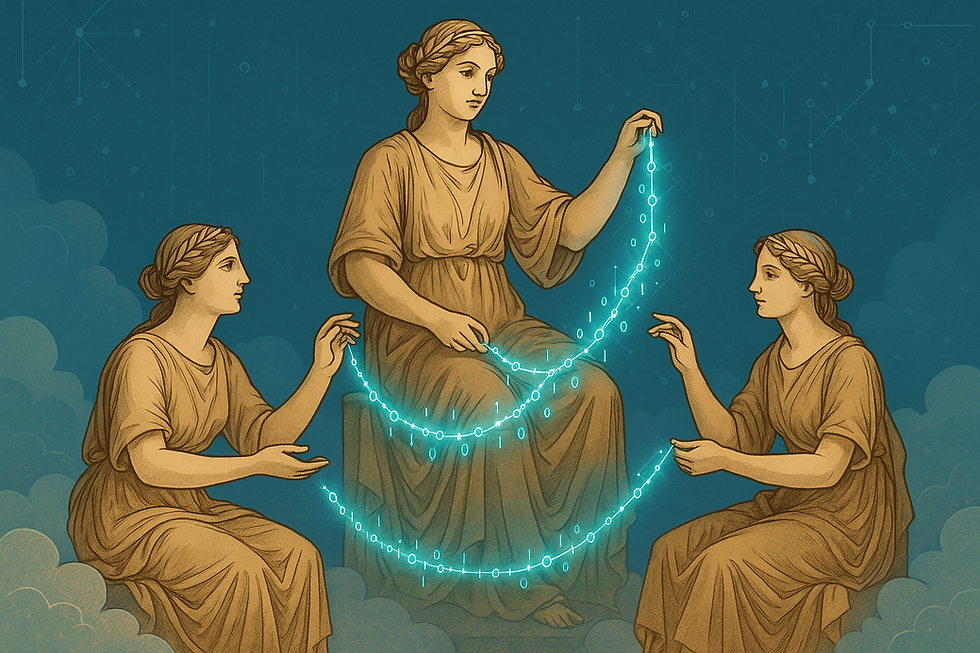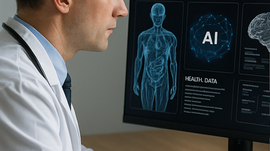Beyond the Algorithms: Reclaiming the Human in the Age of AI
- Eamonn McCormick
- Aug 9, 2025
- 4 min read
Eamonn McCormick
The current debate around artificial intelligence is backwards.
Much of the discourse, particularly from the Doomers of Silicon Valley, presents AI as an autonomous, almost-sentient force that will soon render human labor obsolete. We are fed a constant diet of fear: AI will take our jobs, AI will make its own decisions, AI is the beginning of a new era where human agency will be sidelined.
This entire conversation is fundamentally misguided, and it is time to ground it in a more honest understanding of both technology and ourselves. The truth is, AI's power is immense, but its limitations are equally profound. The true path forward is to see AI for what it is; a tool and to stop philosophically ill-informed attempts to grant it a beingness it can never possess.
The Fundamental Limits of a Non-Deterministic World
The fear of mass unemployment, while emotionally compelling, is not supported by a clear-eyed look at the technology. Today's AI is neither deterministic nor does it possess common sense. It is a probabilistic engine, not a flawless one. It can generate stunning prose and beautiful images, but it cannot perform the same complex task flawlessly, every single time. It is a tool of probabilities, not certainties.
Consider the sobering reality of autonomous vehicles once heralded as the imminent replacement for human drivers. Despite billions in investment and years of development, these systems still struggle with edge cases that human drivers navigate intuitively: construction zones with unclear markings, emergency vehicles requiring immediate response, or the subtle hand signals of a traffic officer. The fatal accidents involving autonomous vehicles underscore a critical truth: probabilistic systems, no matter how sophisticated, cannot match human judgment in unpredictable, real-world scenarios where lives are at stake.
Because AI cannot be trusted to operate flawlessly and has no grounding in the common-sense logic of the physical world, it is a horrible tool to delegate to for any task that requires absolute reliability, trust, or the kind of on-the-spot judgment we use constantly. A doctor cannot solely delegate a diagnosis to an AI. An architect cannot delegate a structural plan. A pilot cannot delegate a flight path. The technology is simply not built for the kind of consistent, error-free execution that human professionals provide.
Delegation vs. Enhancement: The Right Relationship
The correct relationship with AI is not one of delegation, but of enhancement or as some researchers now term it, "augmented intelligence." This refers to technologies that do not replace human decision-making, but rather provide additional information for decision-support.
AI is a spectacular tool to expand our powers. It can help a writer overcome a creative block, a designer explore a thousand new concepts in an hour, or a doctor analyze a patient's scans with unprecedented speed. When a radiologist uses AI to flag potential anomalies in thousands of images, the technology amplifies their expertise rather than replacing it. When an engineer uses AI to simulate thousands of design variations, they remain the arbiter of which solution best serves human needs.
AI shines as a partner, a force multiplier for human ingenuity. It is a calculator on a cosmic scale, a library in a flash, and a tireless creative assistant. But the responsibility, the final judgment, the creative spark, and the moral choice must always remain with the human being. The danger is not that AI will become too powerful, but that we will become too lazy, delegating our most important responsibilities to a technology that is fundamentally incapable of bearing them.
Addressing the AGI Hypothesis
Some argue that artificial general intelligence (AGI) will eventually overcome these limitations, achieving or surpassing human-level cognition across all domains. This hypothesis deserves serious consideration, but it fundamentally misunderstands the nature of intelligence and consciousness. Even if we achieve systems that can mimic human reasoning across multiple domains, they would still lack the embodied experience, the mortality-awareness, and the care for consequences that shape human judgment. AGI, should it emerge, would still be a sophisticated pattern matching system operating on probabilities, not a being with genuine understanding of the weight of its decisions.
The Human Core: Being and Dasein
This brings us to the deepest, most critical point in the debate. We must distinguish between a human being and a data-driven algorithm. The philosopher Martin Heidegger called this core of human existence Dasein "being-there" or "beingness."

Dasein is the primordial ground of being, the sense of self and presence that enables us to create the complex inner worlds we use to navigate the infinitely complex outer world. This is not something that can be simulated by data and algorithms. It is not something that arises from a database of images or a vast repository of text. Dasein is the source of our consciousness, our ability to project meaning, to feel, to have a sense of purpose and to grapple with our own mortality.
The Path Forward: Human-AI Collaboration in Practice
What does successful human-AI collaboration look like? It manifests in scenarios where AI handles the computational heavy lifting while humans provide context, ethics, and wisdom. In legal practice, AI can scan millions of precedents in seconds, but lawyers must interpret their relevance to unique human situations. In creative fields, AI can generate countless variations, but artists select and refine based on emotional resonance and cultural meaning. In scientific research, AI can identify patterns in vast datasets, but scientists must formulate hypotheses and understand implications.

This is human augmentation, not replacement, a research agenda that keeps humans firmly in control while leveraging AI's computational power. The emphasis must remain on technologies that empower rather than mechanize human workers, that enhance our capabilities while preserving our agency.
The Ignorance of Bestowing Beingness
It is high time we stop the philosophically ignorant from bestowing a sense of beingness on data and algorithms. An AI is an incredibly advanced artifact of human intelligence, a powerful tool designed by us to process information. It has no inner world. It has no subjectivity. It has no beingness. To believe that it does is to fundamentally misunderstand what it means to be human and what it means to be a technological creation.
The AI debate is backward because it begins with a false premise. It starts with the technology and asks what it will do to us, rather than starting with human beings and asking how we can use this amazing technology to enhance our lives. AI is a great and amazing tool to expand the lives of human beings. All else is speculation.


























Comments